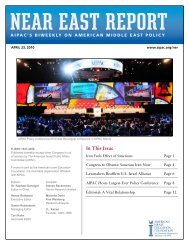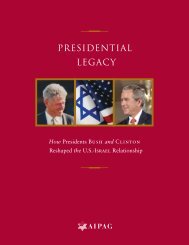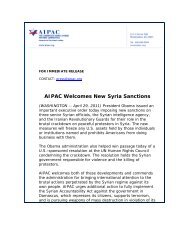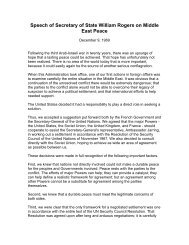2013 Briefing Book - Print Version - Aipac
2013 Briefing Book - Print Version - Aipac
2013 Briefing Book - Print Version - Aipac
You also want an ePaper? Increase the reach of your titles
YUMPU automatically turns print PDFs into web optimized ePapers that Google loves.
ISRAEL AT RISK<br />
What Congress Has Done to Counter<br />
Nuclear Proliferation<br />
Rejected containment as an option. Congress has overwhelmingly passed resolutions<br />
affirming that it is U.S. policy to prevent Iran from acquiring a nuclear weapons<br />
capability and opposing any reliance on a policy seeking to contain a nuclearcapable<br />
Iran.<br />
Focused World Attention on Iran’s Pursuit of Nuclear Weapons. Congress has helped<br />
lead an international effort to draw attention to the dangers of an Iranian nuclear<br />
program. Congressional resolutions have condemned Iran for its repeated violations<br />
of its nuclear non-proliferation obligations and demanded cooperation with<br />
international nuclear inspectors. Members of Congress have reached out to foreign<br />
nations, urging them to enact tougher sanctions on Iran, and reached out to foreign<br />
businesses, urging them to exit the Iranian market.<br />
Passed Far-Reaching Sanctions Against Iran. Congress has passed increasingly tougher<br />
sanctions on Iran. The Iran Sanctions Act of 1996 targeted foreign investment in<br />
Iran’s energy sector—the lifeblood of the Iranian economy. In 2010, Congress passed<br />
the Comprehensive Iran Sanctions, Accountability and Divestment Act (CISADA),<br />
authorizing sanctions against foreign banks that conduct business with Iranian entities<br />
involved in nuclear arms proliferation. CISADA also includes key provisions targeting<br />
nations that allow shipment of illicit materials to Iran. In 2011, Congress passed<br />
unprecedented sanctions against Iran’s Central Bank, a key facilitator of Iran’s nuclear<br />
weapons program.<br />
Both the House and Senate in August 2012 overwhelmingly passed the Iran<br />
Threat Reduction Act of 2012, which enshrines in law that it is U.S. policy to<br />
prevent Iran from obtaining nuclear weapons, escalates the level of sanctions<br />
against the regime’s human rights violators, and sharply tightens the enforcement<br />
of existing sanctions law.<br />
Cut Off Flow of Dual-Use Materials to Iran and Syria. U.S. export laws currently<br />
restrict sales of dual-use American technology and Congress has passed legislation<br />
authorizing sanctions against foreign entities that supply nuclear and missile<br />
components to Iran. Congress has also provided significant funding for diplomatic,<br />
military and intelligence efforts to intercept illicit shipments to Iran.<br />
86








